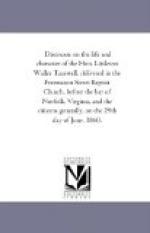“I had long been curious to see the natural vigor, fertility, and adroitness of Mr. Tazewell contrasted with the consummate art and accomplished prowess of Mr. Pinkney; and participated in the public disappointment, (as I must ever deplore the cause which produced it,) when the death of Mr. Pinkney rendered it impossible, just at the moment that the contest was to take place. But a few days before Mr. Pinkney’s death, (a circumstance which probably hastened it,) he had exerted himself very much in the argument of a cause of great interest to his client. Immediately the discussion was over, and while the accents of that cycnea vox reverberated in the ears of all who heard the last effort of his eloquence, he began the preparation for his argument with Mr. Tazewell. His application was too intense; his strength, and health, and life, sunk under it; and they who hastened from a distance to witness the competition, beheld anticipated victory and triumph turned into a funeral procession: O fallacem hominum spem, fragilemque fortunam, et inanes nostras contentiones!”
The reader will keep in mind that this sketch by Mr. Gilmer was written nearly forty years ago, and before Mr. Tazewell appeared in the Senate of the United States.
No. IV.
EXTRACTS FROM THE LETTERS OF MR. TAZEWELL RESPECTING PUBLIC OFFICE.
Mr. Tazewell kept no copies of his letters to his friends, and I make the subjoined extracts, explanatory of his views respecting public office, wholly from those in my own possession. I may state here that when a commissioner was appointed to Kentucky, in 1823, Mr. Tazewell was consulted on the subject by some of his friends in the General Assembly, and he agreed to undertake the office; but when he heard that the friends of Benjamin Watkins Leigh, his warm personal friend, desired the appointment of that distinguished jurist, he sent a peremptory withdrawal of his name, and urged the nomination of Mr. Leigh. When he believed that the arbiters of the dispute between Kentucky and Virginia would be chosen at large, he suggested the names of Jeremiah Mason of New Hampshire, William Hunter of Rhode Island, and Langdon Cheves of Philadelphia.
In a letter, dated January 1, 1823, he says: “I ask nothing from my country, but there is nothing she should ever require of me in vain.... As a citizen of Virginia, I hold myself bound at all times to render any aid which it may be within the compass of my poor abilities to offer in furtherance of the rights, the interests, and even the wishes of its government.... Proud as I should be at being selected as the advocate of my country’s rights by the unsolicited voice of her legislature, I could not purchase even this gratification at the expense of any whom I love, esteem, or admire.”




